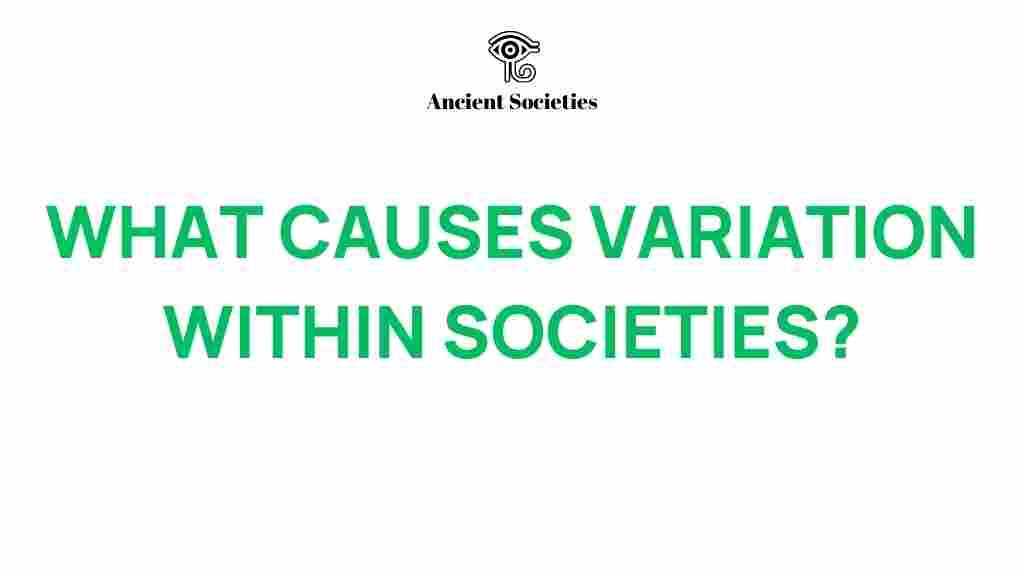Unraveling the Factors Behind Societal Variation
Societal variation is a complex phenomenon influenced by numerous factors, including culture, history, social dynamics, and human behavior. Understanding these elements is crucial for grasping how diverse communities evolve and interact. This article aims to explore the intricate tapestry of societal variation, examining the role of anthropology, sociology, and the myriad influences that shape human societies.
The Importance of Understanding Societal Variation
Societal variation refers to the differences in social structures, practices, and cultural expressions across different communities. These variations can be observed in various domains, such as:
- Language: Different languages signify unique cultural identities.
- Traditions: Festivals and rituals play a central role in community cohesion.
- Social Norms: What is acceptable behavior can vary widely.
- Economic Systems: Variations in wealth distribution influence community dynamics.
By understanding these differences, we can foster greater empathy and cooperation across cultures, ultimately enhancing global harmony.
Factors Influencing Societal Variation
Several key factors contribute to societal variation, including:
- Culture: The shared beliefs, values, and practices of a group.
- History: Historical events shape current societal structures and relationships.
- Social Dynamics: Interactions among individuals and groups influence social behavior.
- Human Behavior: Psychological factors affect how people respond to their environments.
- Diversity: The presence of different cultural and ethnic groups enriches society.
- Community: The relationships and bonds formed within a group.
- Sociology: The study of social behavior provides insights into societal trends.
Step-by-Step Exploration of Key Influences
To better understand societal variation, we can analyze each factor in detail:
1. Culture
Culture encompasses the language, arts, customs, and beliefs of a group. It is transmitted through generations and evolves over time. Variations in culture can lead to different worldviews and social practices.
2. History
Historical events such as wars, colonization, and migrations have lasting impacts on societies. For example, the legacy of colonialism can still be felt in the social and economic structures of former colonies.
3. Social Dynamics
Social dynamics refer to how individuals and groups interact. This includes power relations, social hierarchies, and community structures. Understanding these interactions can help us navigate complex social landscapes.
4. Human Behavior
Human behavior is influenced by both biological and environmental factors. Psychological theories, such as Maslow’s hierarchy of needs, suggest that behavior is driven by the quest for fulfillment, impacting societal structures.
5. Diversity
Diversity enriches societies by introducing a variety of perspectives and experiences. Celebrating diversity can lead to innovation and resilience within communities.
6. Community
Communities create a sense of belonging and identity. The strength of community ties can significantly influence individual behavior and societal norms.
7. Sociology
Sociology provides the tools to analyze and understand the complexities of societal variation. It examines the relationships between individuals and the larger social structures they inhabit.
Troubleshooting Tips for Understanding Societal Variation
Here are some tips for individuals and researchers looking to delve deeper into societal variation:
- Engage with Diverse Communities: Participate in community events to gain firsthand experience.
- Read Widely: Explore literature from various cultures to broaden your perspective.
- Study Anthropology: This field provides insights into cultural practices and human behavior.
- Use Sociological Methods: Surveys and interviews can reveal social dynamics and community sentiments.
- Attend Workshops: Engage in discussions about diversity and inclusion to enhance understanding.
By actively seeking to understand the factors behind societal variation, we can cultivate a more inclusive and empathetic society.
Conclusion
Societal variation is a rich tapestry woven from the threads of culture, history, social dynamics, and human behavior. It reflects the diversity of human experience and the complexities of community relationships. By studying these factors through the lenses of anthropology and sociology, we can appreciate the nuances of different societies and foster a spirit of cooperation and understanding.
Understanding societal variation not only enhances our knowledge but also enriches our personal lives and the communities we are part of. Embracing diversity is crucial for navigating the challenges of our globalized world.
For more insights into the impact of culture on society, visit this resource.
Let us continue to explore the fascinating world of societal variation and contribute to a more harmonious existence across cultures.
This article is in the category Society and created by AncientSocieties Team
